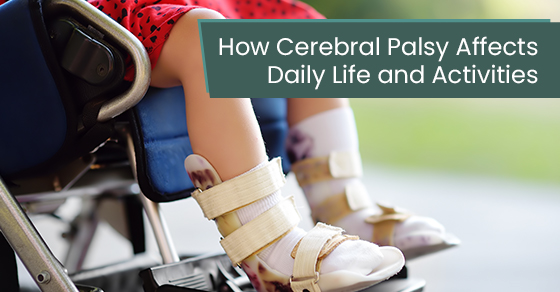Cerebral palsy (CP) is a neurological disorder that affects movement, muscle coordination, and posture. Although CP may have several causes, medical negligence during pregnancy, childbirth, or the immediate postnatal period can also cause it. The consequence of such neglect can be devastating for the child and their family.
Understanding the challenges associated with CP caused by medical negligence helps legal professionals protect and evaluate the affected individual’s future needs, ensuring that any settlement or compensation obtained considers the individual’s ongoing requirements.
The Consequences of Negligence: How Cerebral Palsy Impacts Daily Life
From physical limitations and mobility challenges to communication difficulties and the emotional toll, we will next explore the multifaceted impact of CP on those affected.
1. Motor impairments
- Mobility challenges: Individuals with CP may have difficulties walking, maintaining balance, or performing coordinated movements. They might require adaptive equipment, such as crutches, walkers, wheelchairs, and braces.
- Fine motor skills: CP can affect fine motor skills, making it challenging to perform tasks that require precise movements, such as writing, using utensils, or buttoning clothes. Occupational therapy can help those affected by CP develop strategies to enhance their fine motor skills and improve independence.
2. Self-care limitations
Simple activities like dressing, feeding, and personal hygiene can be arduous tasks for individuals with CP, thus requiring assistance or adaptive equipment.
3. Communication and speech difficulties
- Speech impairments: CP may affect the muscles controlling speech, resulting in slurred speech, difficulty articulating words, or a complete inability to speak. Augmentative and alternative communication (AAC) devices can assist individuals in expressing themselves.
- Language and comprehension: Some individuals with CP may experience difficulties with language processing, comprehension, and cognitive functions, impacting their ability to communicate effectively and understand information.
4. Social and emotional challenges
- Isolation and stigma: The physical limitations and communication difficulties associated with CP can lead to social isolation, as individuals may struggle to interact with their peers or participate in social activities.
- Emotional well-being: Coping with the challenges of CP can lead to emotional stress, anxiety, and depression. Access to mental health support is crucial to help individuals and their families navigate these emotional difficulties.
5. Educational and professional limitations
- Special education needs: Individuals with CP often require specialized education tailored to their unique needs. This may involve individualized learning plans, assistive technology, and supportive services.
- Employment challenges: The physical and cognitive limitations associated with CP can impact employment opportunities and career choices. However, individuals with CP can pursue fulfilling careers with the proper support and accommodations.
6. Healthcare needs
- Rehabilitation and therapy: Individuals with CP often require extensive rehabilitation, including physical therapy, occupational therapy, speech therapy, and other interventions to improve motor skills, mobility, and communication.
- Medical interventions: CP may necessitate ongoing medical care, including regular check-ups, medication management, and surgical interventions to address associated conditions or complications.
The Vital Role of Financial Compensation in Cerebral Palsy Cases
Financial compensation for cerebral palsy caused by medical negligence aims to provide fairness and justice for the affected individual and their family. It acknowledges the preventable harm caused by negligence and seeks to restore some measure of justice by holding responsible parties accountable and providing financial support for the following:
Medical Care
Caring for someone with cerebral palsy often comes with significant financial burdens. Compensation can assist caregivers in covering medical expenses and therapy costs, thereby reducing their financial burden.
Financial relief can also reduce stress and allow caregivers to focus on their caregiving role without being overly concerned about their financial situation.
Home Modifications
Modifying the living environment is often necessary to accommodate the unique needs of individuals with CP. This may involve installing ramps, widening doorways, creating accessible bathrooms, and adapting the home to facilitate mobility and accessibility.
Compensation can assist in covering the costs of these modifications to ensure a safe and comfortable living environment.
Assistive Devices and Mobility Aids
Depending on the severity of the disease, individuals may require assistive devices and mobility aids, such as wheelchairs, orthotic devices, communication devices, and adaptive equipment, to enhance their independence and quality of life.
Compensation can provide the financial means to obtain and maintain these essential assistive tools.
Vocational Training and Employment Support
Young people with CP may require vocational training and support to develop skills and pursue employment opportunities.
Compensation can help fund vocational training programs, job coaching, assistive technology for the workplace, and other resources that facilitate independence and integration into the workforce.
Caregiver Support
The emotional toll of caring for someone with CP can be significant. Counseling and therapy can assist caregivers in developing coping mechanisms, managing their emotions, and maintaining their mental health.
Compensation can cover therapy sessions, providing a secure space for caregivers to address emotional challenges, tension, and exhaustion that may result from their caregiving responsibilities.
Future Needs and Support
Living with CP is a lifelong journey. Those affected by the condition must receive ongoing medical care, such as regular check-ups, medication management, and specialized treatments to manage their symptoms.
Compensation can help ensure access to these interventions throughout the individual’s life.
How Our Cerebral Palsy Lawyers Can Help
If you or your loved one has been affected by CP due to medical negligence, seeking legal advice from a lawyer specialized in medical malpractice cases can help you understand your rights and pursue justice.
At Sommers Roth & Elmaleh, our compassionate lawyers understand the challenges associated with cerebral palsy caused by medical negligence. They can effectively advocate for compensation that adequately addresses the financial, emotional, and physical hardships the affected individuals and their families endured.
To speak with an experienced cerebral palsy lawyer, call Sommers Roth & Elmaleh today at 1-844-940-2386 or contact us here.

